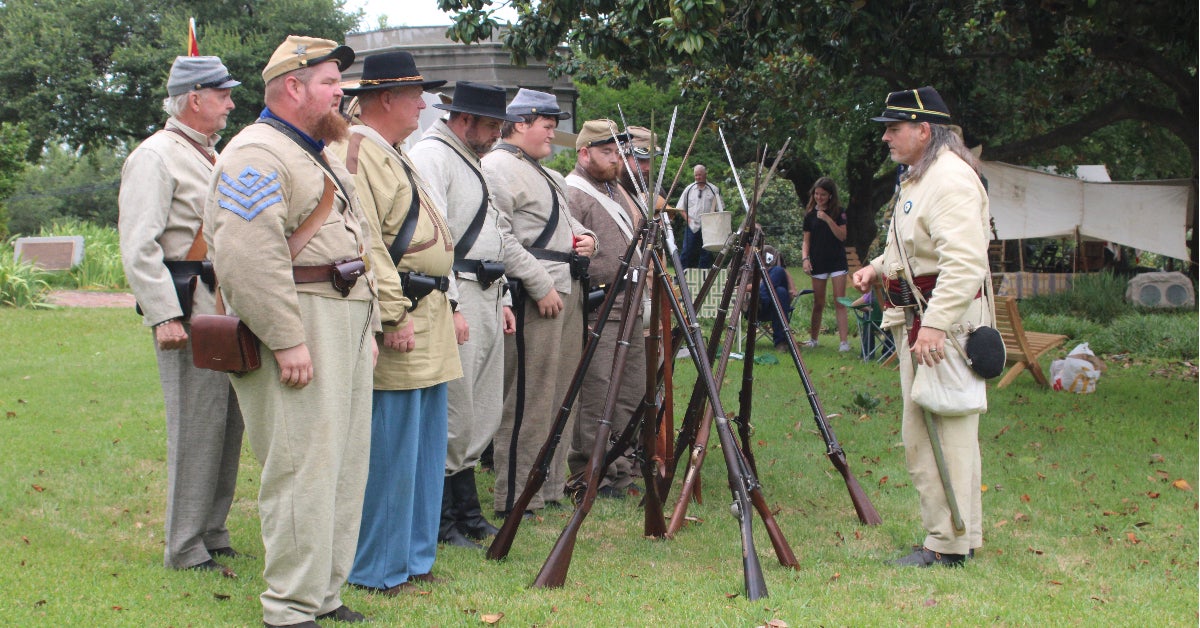SIEGE 160: Condition of his army forces Pemberton to surrender Vicksburg
Published 8:00 am Saturday, July 1, 2023

- Confederate re-enactors prepare to go through drills at a program in 2022 on the grounds of the Old Court House Museum. The museum will feature a Confederate encampment and re-enactors discussing the siege and surrender of Vicksburg Saturday. (Photo by John Surratt | The Vicksburg Post)
Editor’s note: This story is the final installment of The Vicksburg Post’s coverage of the 160th anniversary of the Siege of Vicksburg.
It’s June 30, 1863, and Confederate Lt. Gen. John C. Pemberton is beginning to realize the condition of his command.
Grant’s siege, which began May 18, has taken its toll. Vicksburg and Pemberton’s troops are cut off from supplies and he doesn’t believe the rations and the health of his men will hold out until Gen. Joseph E. Johnston arrives with his army.
Pemberton sends messages to his ranking division and brigade commanders to determine if the troops can fight their way through Maj. Gen Ulysses Grant’s forces and escape the trap.
“He wants to know: Can they break out of the defenses of Vicksburg, cut their way through Grant’s Army, cross the Big Black River, make it to Jackson, link up with Joseph Johnson’s army, get resupplied, refitted and then try to come back and take Vicksburg?” said Andrew Miller, lead park ranger at the Vicksburg National Military Park. “Many of his officers obviously reply that there’s no way that they could potentially do that.”
Pemberton calls a meeting of his division commanders and some of his brigade commanders to the Willis House on Crawford Street, where he asks each individual commander in person if they can break out and escape, only to receive the same answer — there’s no way that could potentially happen.
After talking with his commanders, Pemberton realizes he needs to request potential terms from Grant for surrendering Vicksburg. On July 2, Pemberton sends Major Gen. John S. Bowen, who knows Grant, to deliver his message. Bowen requests and immediate audience with Grant but Grant refuses, insisting he will talk only to the garrison commander.
Bowen then tells Grant he has the authority to tell him that Pemberton will meet with Grant between the lines at 3 p.m. 0n July 3 and Grant agrees. Bowen returns to Pemberton’s headquarters and tells Pemberton that Grant requested to meet him between the lines at 3 p.m.
The generals met south of Jackson Road on July 3. When Pemberton asked for terms, Grant lived up to his nickname, “Unconditional Surrender Grant,” and said no terms other than unconditional are acceptable.
“Pemberton, receiving that reply, flies off the handle in a very bombastic way, tells Grant that there’ll be many more dead federal soldiers before the Union Army ever captures Vicksburg,” Miller said.
Grant in response removes himself and Pemberton from the situation and tells Pemberton, “’Let’s let our officers discuss the potential terms. Why don’t you and I kind of sit back and, and remove ourselves from this scenario and talk about the old days?'” Miller said. “’Let’s talk about the old Army and talk about the Mexican War.'”
Grant and Pemberton were staff officers on a particular general’s staff during the Mexican War, Miller said, and were familiar earlier on in their military careers as well. They removed themselves and allowed those officers to potentially hash out terms.
But when the generals return, no terms have been decided and Grant ends the meeting. The generals return to their respective headquarters.
“Grant will go to his headquarters where he will gather what he said in his memoirs ‘would be the only council of war that I ever put together,’” Miller said.
Grant and his staff hammer together the potential surrender terms, which include paroling the Confederate Army on the field of battle, allowing them to stack their arms and banners, and gather provisions, food and wagons.
The terms allow Pemberton’s men to march out of the city of Vicksburg as paroled prisoners.
Grant, however, refuses to allow the officers to take their personal servants, or slaves, with them.
Pemberton accepts the terms and surrenders Vicksburg at 10 a.m. on July 4, but it takes several days for news of Vicksburg’s fall to reach Washington, D.C., and President Abraham Lincoln. A courier carrying the message had to take a boat to Cairo, Ill., the only place with direct telegraph communication with Washington.
Lincoln, who was in direct communication with the Army of the Potomac, knew about the Confederate defeat at Gettysburg, ending Gen. Robert E. Lee’s invasion of the North.
“Then he gets the message that Vicksburg has fallen and effectively that the Mississippi River really is under the control of federal authorities now. And of course, his famous quote that ‘The Father of Waters flows vexed to the sea,’” Miller said.
The combined victories of Vicksburg and Gettysburg changed the course of the war, which continued for another two years.




